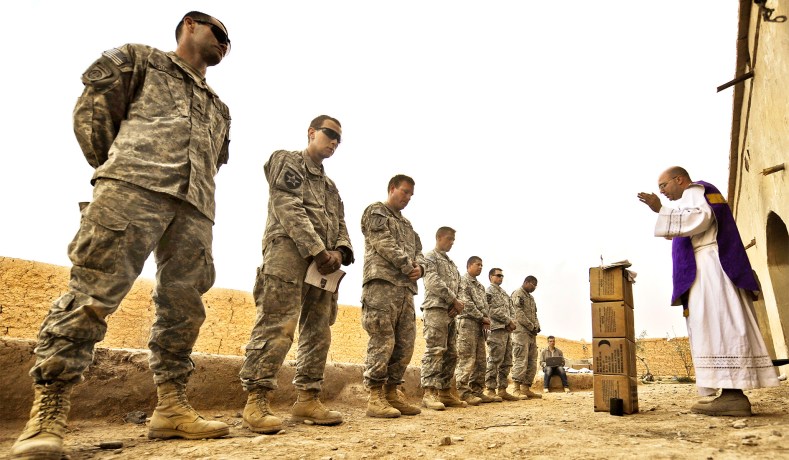

In my 16 years in the U.S. Marine Corps, both on active duty and now in the reserve, I have had the privilege of serving with many fine officers. I know firsthand that the difference between life and death is often a matter of leadership. Whether in combat or in training, strong and decisive leadership inspires confidence, improves morale, and contributes to the ethos of professionalism that has made the U.S. military the finest fighting force in the world.
As director of military affairs for a religious-liberty law firm, I have recently observed a disturbing trend that, if left unchecked, threatens to weaken our military from within. What began as passive-aggressive political correctness has devolved into open hostility to religious liberty in the military. Recent disturbing events within the U.S. Army are a perfect example of both.
An Army investigator under the command of Major General Kurt Sonntag recommended that Army chaplain Scott Squires be found guilty of “dereliction of duty” for rescheduling a marriage retreat that Squires is prohibited from facilitating so that another chaplain could handle it. A same-sex couple had registered for the retreat, and Squires is endorsed by the Southern Baptist Convention’s North American Mission Board (NAMB), which prohibits its chaplains from conducting marriage-related events for same-sex couples. NAMB’s policy clearly states that “endorsed chaplains will not conduct or attend a wedding ceremony for any same-sex couple, bless such a union or perform counseling in support of such a union . . . nor offer any kind of relationship training or retreat, on or off a military installation.”
Army regulations also require chaplains to comply with the policies of their endorsing agency. So when the couple registered for the “Strong Bonds” event Squires was facilitating, rather than disobey both his endorsing agency and the Army itself, Squires rescheduled the conference so that another chaplain could lead it. Surprisingly, the couple chose not to attend. Instead, they filed a complaint.
The Army investigator, either intentionally or negligently, failed to include important information in the final report — statements that make clear that Chaplain Squires did exactly what he was supposed to do.
The Army investigated the complaint and, based on the investigator’s recommendation that Squires be found in “dereliction of duty,” he could potentially face a court-martial and possible prison time for the “crime” of adhering to his religious beliefs and following Army regulations.
But the Army investigator, either intentionally or negligently, failed to include important information in the final report — statements that make clear that Chaplain Squires did exactly what he was supposed to do. Not only did Chaplain Squires immediately notify his senior chaplain, who approved of Squires’s solution, but the chaplain who replaced him on the marriage retreat told the investigator, “He was responsible in his duties the entire time as I see it.” How can someone who is “responsible in his duties” be charged with “dereliction of duty”?
And it wasn’t enough for the Army to go after Chaplain Squires — it also accused his assistant of discrimination. Staff Sergeant Kacie Griffin’s reprimand is for informing Chaplain Squires that the couple had registered and informing the couple that the chaplain would speak with them about it. That’s it. The Army brass considered that by telling Chaplain Squires about the presence of a same-sex couple, Sergeant Griffin had abetted him in an act of discrimination.
Staff Sergeant Griffin’s immediate commander initially cleared her of any wrongdoing, stating “there was no discriminatory action.” But the couple appealed to Major General Sonntag. He ordered further investigation into the situation and refused to clear Staff Sergeant Griffin of any wrongdoing for her purely administrative act.
Because of Major General Sonntag’s decision to investigate, Staff Sergeant Griffin now has a “flag” on her personnel files. That decision ended her chance to participate in the “Green to Gold” program, a highly selective, once-in-a-lifetime opportunity for this African-American soldier to attend college and return to the Army as a commissioned officer.
The commander in chief and the attorney general of the United States have placed the highest priority on protecting religious liberty. Charging a chaplain with “dereliction of duty” for following the rules, and ruining the career of an enlisted soldier for an administrative act, suggests that some in the Army do not share that priority.
The Army, or Congress, must act quickly to prevent further loss of trust between Major General Sonntag and the chaplains under his command. Our service members make many sacrifices for our freedoms, but religious liberty should not be one of them.
IN THE NEWS: ‘Colorado Baker in SCOTUS Case Sues Colorado over “Persecution”‘